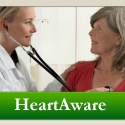Heart disease is often thought of as a man’s problem. That’s not true. One in eight women aged 45 to 64 and one in four women over the age of 65 has heart disease. Coronary heart disease is the single largest cause of death for females in the United States.
Each year, about 372,000 women age 65 and older have a heart attack. Beginning at age 45, more women than men have elevated cholesterol. About 21 million women age 60 and older have high blood pressure. Women are more likely than men to die within a few weeks of a heart attack. Their symptoms are often dismissed and undertreated. And women themselves are sometimes to blame for not seeking help sooner.
Part of the problem is that when women have heart attacks, their symptoms may be different or misdiagnosed. Men typically suffer suffocating chest pains, but women’s symptoms may be more subtle and ignored. Symptoms to look for include:
- Heavy perspiration
- Shortness of breath
- Abdominal pain
- Sharp upper body pain
- Chest pain
- Rapid heart rate
- Disrupted sleep
Tests
Chest X-ray
This diagnostic test uses electromagnetic energy to produce images of internal tissues, bones, and organs.
Electrocardiogram (ECG)
With electrodes taped to the chest, an ECG records the electrical activity of the heart, shows abnormal rhythms and detects heart muscle damage.
Echocardiogram (An Echo)
This noninvasive test uses sound waves to produce a study of the motion of your heart's chambers and valves.
Stress Test
A cardiac stress test measuresyour heart's ability to respond to external stress in a controlled clinical environment. The stress response is induced by exercise or by drug stimulation.
BNP Testing
B-type natriuretic peptide (BNP) is a hormone released from the ventricles in response to increased wall tension that occurs with heart failure. BNP levels are useful in the rapid evaluation of heart failure. The higher the BNP levels, the worse the heart failure.
Cardiac Catheterization
This procedure uses a catheter threaded through blood vessels into the heart to see inside the heart, measure pressures, look at blood vessels and help determine therapy options. UHealth is home to the Elaine and Sydney Sussman Cardiac Catheterization Lab, which provides advanced imaging capabilities and pinpoint accuracy for new and complex procedures.
Treatments
Emergency Treatment
- In emergency situations, you will have continuous monitoring of your heart and vital signs.
- Intravenous therapy may include beside fluids, intravenous nitroglycerin or morphine to control pain and decrease the workload on the heart.
- Oxygen therapy will help provide more oxygenation to your damaged heart muscle.
- Drugs such as beta-blockers or calcium channel blockers promote blood flow to the heart, improve the blood supply, prevent arrhythmias, and decrease heart rate and blood pressure.
- Intravenous infusion of a medication which dissolves the blood clot, called fibrinolytic therapy, can restore blood flow.
- Antithrombin/antiplatelet drugs are used to prevent further blood clotting.
- Antihyperlipidemics are medications used to lower lipids (fats) in the blood, particularly Low Density Lipid (LDL) cholesterol. They may include statins or bile acid sequestrants to reduce cholesterol levels.
Once the condition has been completely diagnosed and you are stabilized, additional procedures to open the coronary arteries and restore blood to the heart may be recommended by your doctor.
Coronary Artery Procedures
This procedure uses a balloon threaded into the artery to create a bigger opening in the vessel to increase blood flow. There are several types of PTCA procedures. In a balloon angioplasty, a small balloon is inflated inside the blocked artery to open the blocked area and then is removed. An atherectomy involves the blocked area inside the artery being cut away by a tiny device on the end of a catheter. Patients can also receive laser angioplasty, in which a laser used to "vaporize" the blockage in the artery. A coronary artery stent uses a tiny coil which is expanded inside the blocked artery to open the blocked area and which is then left in place to keep the artery open.
Coronary Artery Bypass
This surgery is for people who have chest pain (angina) and coronary artery disease (where plaque has built up in the arteries) or who have had a heart attack. During the surgery, a bypass is created by grafting a piece of a vein above and below the blocked area of a coronary artery, enabling blood to flow around the obstruction. Veins are usually taken from the leg, but arteries from the chest or arm may also be used to create a bypass graft.
Clinical Trials
In addition to a standard therapy some patients will qualify for clinical trials.
Why Choose UHealth?
A multidisciplinary team of heart health experts. Making sure every aspect of your individual situation is addressed, your team may include a cardiothoracic surgeon, a general cardiologist, interventional cardiologist, experts in cardiac imaging, and a host of other team members, including social workers, nutritionists, physical therapists and any others that may be needed for your case.
Cardiac screening and rehabilitation. If you have experienced a heart attack, we coordinate your cardiac rehabilitation to return you to a safe level of functioning. If you have undetected risk factors, we can identify those and keep an eye on your progress.
HeartAware: Free on-line health risk assessments that may save your life

Over 80 million American adults (more than one in three) have cardiovascular disease (CVD). Nearly 2,300 Americans die of CVD every day — that’s one death every 38 seconds. This number can be significantly reduced through education and early detection.
Questions? We're here to help.
Our appointment specialists are ready to help you find what you need. Contact us today.